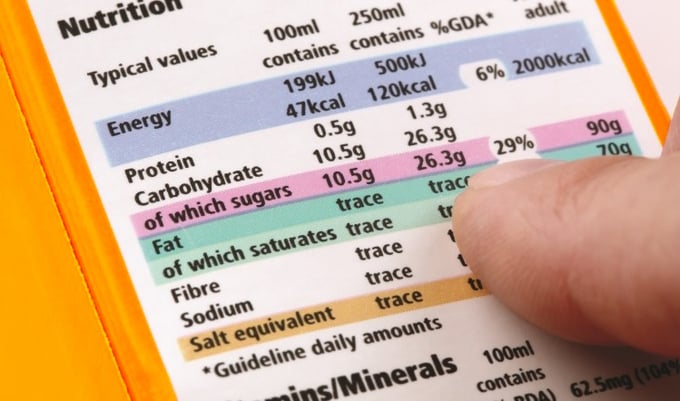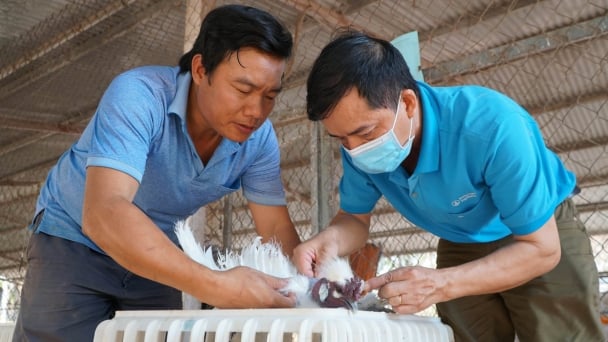May 16, 2025 | 09:51 GMT +7
May 16, 2025 | 09:51 GMT +7
Hotline: 0913.378.918
May 16, 2025 | 09:51 GMT +7
Hotline: 0913.378.918

Regulation (EU) No 1169/2011, a European Union law that establishes regulations for food information and labeling, the labeling requirements for commodities exported to the EU.
According to Regulation (EU) No 1169/2011, a European Union law that establishes regulations for food information and labeling, the labeling requirements for commodities exported to the EU became effective on December 13, 2014.
The Acting Director of the Vietnam TBT Office Ton Nu Thuc Quyen, stated that there are several significant requirements, including the provision of clearer and more consistent food information, as well as nutrition information for most kinds of prepackaged processed foods. Specially, labels are prohibited from implying that the food has the potential to prevent, treat, or cure human diseases.
"Marking and labeling must not create unnecessary trade barriers beyond what is necessary to achieve legitimate objectives," according to Uyen.
She further explained that importing countries are not allowed to require importers to register or pre-certify labels or markings as a condition for placing products—already compliant with mandatory technical requirements—on the market, except in cases where it is necessary due to risks to human, animal, or plant health, life, the environment, or national security.
According to the leadership of the Vietnam TBT Office, product labels typically include around 12 essential pieces of information, such as: the name of the food product, a list of ingredients, the quantity of certain ingredients or ingredient groups, the net weight of the product, the minimum shelf life or "use by" date, storage conditions and/or special usage instructions if applicable, as well as the name or business name and address of the food business operator.
Furthermore, when any ingredient or additive listed in Annex II of Regulation 1169/2011, or derived from substances or products listed in Annex II that may cause allergies or intolerances, is used in the production or processing of the food and is present in the final product, even in a modified form, it must be declared.
In situations where appropriate consumption of the food would be challenging without such guidance, the label must also include usage instructions. It is also necessary to specify the alcohol content for alcoholic beverages that contain more than 1.2% alcohol by volume.
Dr. Ton Nu Thuc Uyen underscored the importance of product labeling regulations, specifically the prohibition of labels that falsely claim the presence of ingredients that are not actually present in the product, mislead consumers regarding quantity, composition, or origin, or emphasize product characteristics that are common to all similar products.

Acting Director of the Vietnam TBT Office Ton Nu Thuc Quyen. Photo: Tung Dinh.
Additionally, a representative from the Vietnam TBT Office observed that nutritional labeling is a significant concern for European consumers.
Businesses are encouraged to include front-of-pack labeling and to voluntarily reaffirm necessary mandatory nutritional information that is important to public health on the front of the packaging. The nutritional information that is repeated must be presented in one of the following formats: energy value (kJ and kcal) plus fat/saturated fat/sugar/salt content. Finally, it is essential that product labels adhere to the regulations regarding health and nutrition claims.
For instance, a functional claim could assert that "Calcium is crucial for bone development." A claim that reduces the risk of disease could be: "Proper calcium intake reduces the risk of osteoporosis." Meanwhile, a child growth and health claim might state: "Calcium is necessary for the development of children's bones."
Melatonin aids in alleviating the symptoms of jet lag, which is an additional form of nutrition and health claim. This claim is only admissible for foods that contain a minimum of 0.5 mg of melatonin per serving. It is also necessary to inform consumers that the desired effect is achieved by ingesting 0.5 mg of melatonin in the hours leading up to bedtime on the first day of travel and for a few days afterwards.
Ms. Uyen emphasized the importance of adhering to the EU's stringent and detailed packaging and labeling regulations, and she advised food businesses to refrain from modifying product information in a manner that could potentially mislead consumers or diminish the level of consumer protection. Businesses must also guarantee that the food business the owner receiving the product is provided with all pertinent information regarding pre-packaged foods that are intended for consumers or large-scale catering establishments.
This guarantees that the final consumer receives the necessary food information when it is required. The packaging or a label affixed to it must display mandatory food information for pre-packaged foods. Consumers within the country of distribution must be capable of comprehending this information. The presentation of these details in one of the official EU languages may be required by EU member states within their individual territories. "Businesses must proactively research information on technical barriers to trade (TBT) to protect their interests against unnecessary trade risks," Ms. Uyen recommended.

(VAN) Vietnam's draft amendment to Decree No. 156 proposes a mechanism for medicinal herb farming under forest canopies, linking economic development to population retention and the sustainable protection and development of forests.

(VAN) In reality, many craft village models combined with tourism in Son La have proven effective, bringing significant economic benefits to rural communities.

(VAN) The international conference titled Carbon Market: International experiences and recommendations for Vietnam was successfully held recently in Ho Chi Minh City.

(VAN) According to the Project on rearranging provincial and communal administrative units, in 2025, the country will have 34 provinces/cities, 3,321 communes, wards, and special zones, and no district-level organization.

(VAN) The vice president of fertilizer with Stone X Group says the Trump administration’s tariffs are impacting fertilizer markets.

(VAN) Resolution 57 offers Vietnam a significant opportunity to narrow the global genetic technology disparity and convert its extensive genetic resources into commercial advantages.

(VAN) The Ministry of Agriculture and Environment will prioritize the implementation of five core and breakthrough solutions in science and technology, in addition to the seven groups of tasks identified in Decision No. 503.